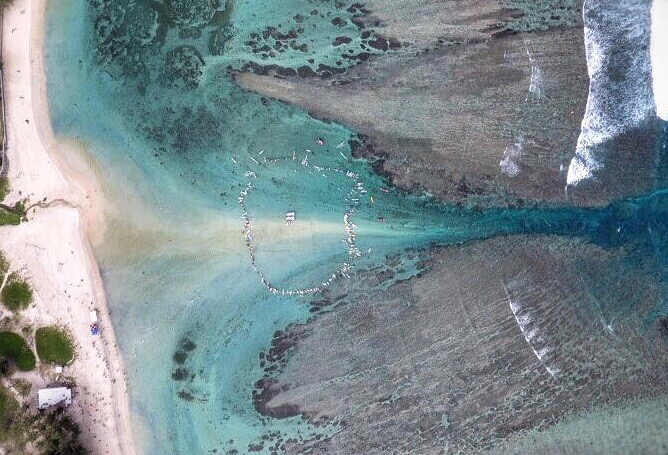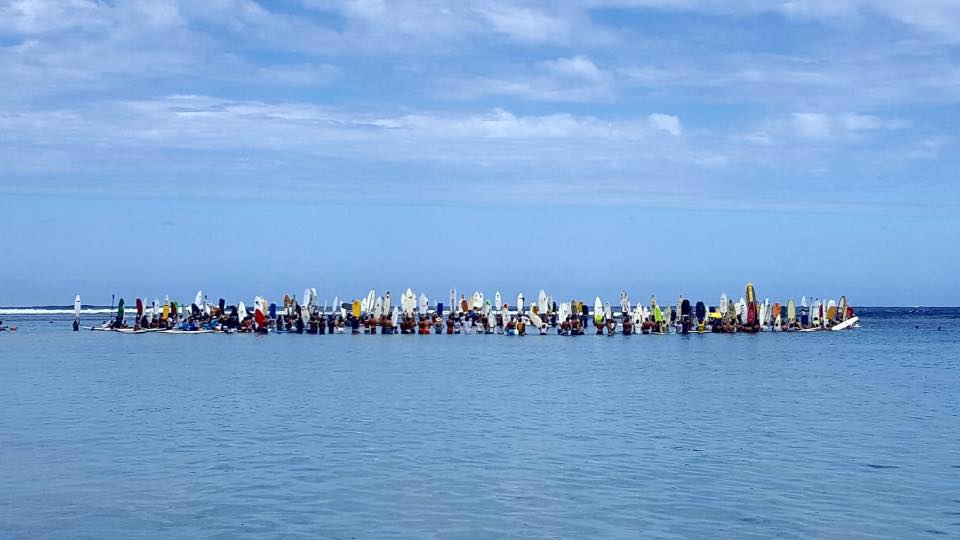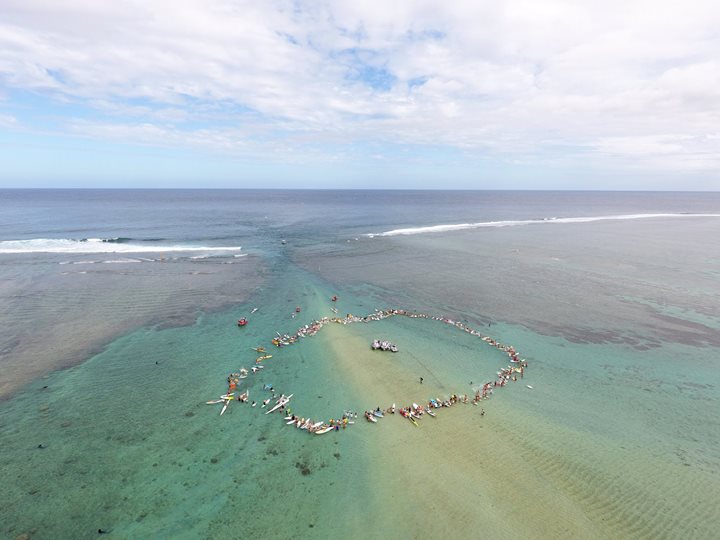Published on http://beachgrit.com/2017/05/opinion-shark-phobia-is-justified/
I was quite amazed to read Morgan Dunn's article in your columns, as it uses all sorts of dubious comparisons to show that fear of sharks is more a matter of fantasy than of reality.
On the planet’s scale (and for the US) it might be the case indeed, as the US has an extremely low mortality rate: for its 320 million inhabitants, 3.1 million surfers, millions of bathers, (including Hawaii) there has been only 3 deaths between 2011 and 2017.
But in shark attacks “hot spots”, this kind of arguments are stupid at best and intentionally misleading at worst.
In high-risk, unprotected places like Recife (Brazil), Ballina (Australia) or Reunion Island, the population is literally terrorized and fewer & fewer people are going in the water in recent years.
Reunion Island is probably the “best” example, since our tiny island counts 9 deaths and 5 seriously maimed victims since 2011, while at the same time the ocean has been strictly prohibited around the whole island since July 26, 2013.

Less than a few hundred peoples has dared to enter the water since the ocean’s ban, and yet, attacks & fatalities have kept increasing…
Now if you wish to compare Reunion Island with the United States, in relation to the number of their inhabitants, their coastal surface area, and most importantly the number of people at risk, then the US would have had thousands of deaths from shark attacks every year.
Conversely, if we had the same risk as in the US, we might have had 1 death every 400 years.
The problem with conservationists/scientists & eco-moralists like Morgan Dunn, is when they get questioned by the media after an attack, they seek to downplay the risks by all means, using general considerations & “clichés” to explain the particulars of attacks in “hotspots”, where precisely none of the “usual rules” applies !!
This dishonest attitude will, in turn, boost the many would-be “e-co warriors”/e-citizens to come and morbidly spread all these comparisons (even if they do not stand up to analysis), so this should also actually raise the issue of the moral responsibility of those (like Morgan Dunn) who use every tricks in the book (at each & every attack) to mislead public opinion so as to “side with the shark”…
It must be noted, though, that Morgan Dunn is not the one who came up with those ridiculous comparisons… In fact, they originated in the early 2000s, from George Burgess himself (the “pope of sharks”), when he was asked to explain the resurgence of accidents in Florida. (Florida is experiencing 30 attacks a year on average, but nothing “too serious”: 1 death for 150 attacks “only”)
Anxious to divert opinion from his own ignorance and responsibility, he had the brilliant idea to be inspired by a “Direct Club” advertisement (a travel insurance company) to ridicule the risk of deadly shark attacks with other far-fetched & totally unlikely risks, like falling coconuts….
These ludicrous arguments can still be found on the website of the Museum of Natural History in Florida…How can such a scientific institution convey such misguided & disrespectful "arguments" towards victims, survivors, their families and their loved ones?
It was also during the same period that Burgess established its famous correlation between world’s population growths (and therefore ocean user’s growths) and the increase in the number of shark attacks. As previously stated, this might true everywhere else in the world, but not in shark attack “hotspots” (like Reunion Island), where more and more attacks happens even with fewer people in the water.
In conclusion, these amalgams are dangerous because they contribute to disinformation, and they lead thousands of hysterical Internet users (weak minds, lacking recognition & in search of something to do with their life) thinking of themselves as some sort of “eco warriors” to believe that they are on a mission to “save the planet from the apocalypse” by pitilessly harassing, blaming & challenging victims and small, bruised communities such as ours.
Then, to take up the many "arguments" of Morgan: - The recurring accusation of a responsibility of the movie "jaws" Is also a purely Western consideration : around the world sharks are fished for food. Who can imagine that the owners of factory ships or the poor fishermen of the African and Indian coasts fish for shark because of its bad reputation ?
The most ridiculous is that this argument is found mainly in Western regions without fishing. Even in the United States, one of the biggest shark fishing nations, who may believe that the numerous shark fishermen practice this activity because of the shark's bad reputation ?
Why persist in denying the obvious : shark fishing is sustainable !
Morgan's publication also incorporates the classical amalgam with the "100 million sharks caught" in the world, which embodies a monumental social hypocrisy.
- There is absolutely no link between commercial and preventive fisheries
- there is no risk of threat to the species with preventive fishing (because it is only targeting dangerous and prolific predators).
It should be pointed out that preventative fishing is less than 1,500 sharks caught per year only (700 in Australia, 600 in South Africa and an average of 40 the last 5 years in Reunion) versus 76 million caught for consumption around the world !!!!!
Indeed, what interest is there to be so hypocritical for an activity that protects human lives and which only represents 1/50,000 of the world's fishing effort of these animals.
Why are the actions of shark-lovers more focused on necessary preventive fisheries and its ridiculous impact rather than on the commercial fishery ? And there would be so much to tell about shark fins' soups also ...
- It is the same about the comparisons with lightning or car accidents.
Here, in Reunion Island, we are suffering 15 to 20% of the deadly sharks attacks of the whole world (2 death out of 3 of the whole world until now in 2017 in Reunion Island or 66%).
To be able to compare with car accidents, it would also be necessary that 15 to 20% of car accidents of the planet occur on Reunion Island.
Each year there are 700,000 deaths in car accidents on the planet, so our island should have at least 100,000 deaths in car accidents to be able to compare the two phenomena with complete honesty.
A study funded by the French government and conducted by communication specialists in the context of the shark crisis in Reunion Island concluded that these were “manipulations of statistics” without any basis.

And no one questions these idiocies as they are still being used as truth to justify the unjustifiable and for the acceptance of the trivialization of being devoured as an incompressible fatality.
About the risk of drowning, we also deal with an absolute bad faith. Hereunder is an arguing between 2 senators in the Australian parliament three weeks ago : “Mr Peck replied there was an average of 14 (drownings) per year, and answered in the negative when Senator Whish-Wilson asked if those deaths had resulted in “four days in a row of the first four pages of the newspaper (being) about those tragic drownings”.
Surfers have every reasons to be more afraid of sharks than drownings since they are true Waterman: they are the ones who save the most people from drowning in the world !
We agree that great white sharks eat fatter preys like seals. But, for bull sharks and tiger sharks, human flesh is much richer than the fish species they feed off. The study of the forensic doctors shows that there are several tears and mutilations in the attacks in Reunion Island. Please, stop talking about "exploratory bites": here in Reunion Island, the sharks eat and attack several times (3 times on Alexandre on February 21, 2017, twice on Laurent on August 27, 2016)
Mocking about shark attacks will never stop them, but stopping telling lies and supporting public policy, in the regions affected by this scourge, for the conservation of economic, social and human interests will.
We can not be for or against sharks ; it is a false debate: surfers are the greatest defenders of the environment. The protection of great white sharks, bull sharks, tiger sharks on popular beaches doesn’t mean that you are an environmental conservationist, that means that you are egoist, morbid and anti-humanist. There are 524 species of sharks, and some of them are dangerous. We are necessarily for sharks, for nature. On the other hand, we can not stand for the protection of predators, weighting between 300 kg and 2 tons, in human activities areas.
Many people try to reduce the debate to an "extermination", while sharks are extremely clever : the simple return to a fishing pressure could be enough to keep the predators at a good distance. Even though our beaches are still red blood, those who use shark attacks for notoriety and donations ensure that "Shark culling is not working", taking the example of Reunion Island.
It is totally dishonest and criminal to assert this, for here there are still hundreds of people in the water, preventive fishing obviously works, the protected places hit it in the world, and it is absolutely obvious: Removing 50 sharks out of 200 necessarily reduces the risk.
In addition, they are wild animals and only death is likely to keep them at a good distance. Predators are not repelled with hugs, cage diving or tags. There are only six deaths per year on average in the world. As I explain it in my book postface, the shark attack is a real clash of the icons, which went so far as to be staged by Kate Perry in the opening show of the Super Bowl in 2015. Media interest will continue to grow, and our community will continue to tear and be stigmatized by the right-thinking people of the planet.
And yet, as the Prince of Monaco said in June 2013: "to better protect sharks, pillars the oceans, it is imperative to succeed in erasing its image as a predator in public opinion". But rather than choosing the path of derision and the construction of guilty plea for every victim, why would we not agree to resolve definitively the crises in the few hotspots of the planet that represent three quarters of the deadly attacks recorded every year in the world ?
By settling dramatic local crises and accepting the deaths of a few thousand sharks for preventive purposes, we could mitigate the image of bloodthirsty predators in the media and thus better protect millions of others.
To complete this publication, here is my analysis on the current means of protection, and here’s shark attack reality.
Shark attacks will become increasingly common in the United States, especially in California, anyway since large predators are protected there. But the risk should remain acceptable as long as it is spread over a vast territory, and millions of people. Enjoy yourself, but please, do not come to give lessons to those who really suffer from this scourge !
Jean François Nativel, may 08 2017
author of the book « shark attack in Reunion, a modern tragedy » (december 2015)
English version available in october.
